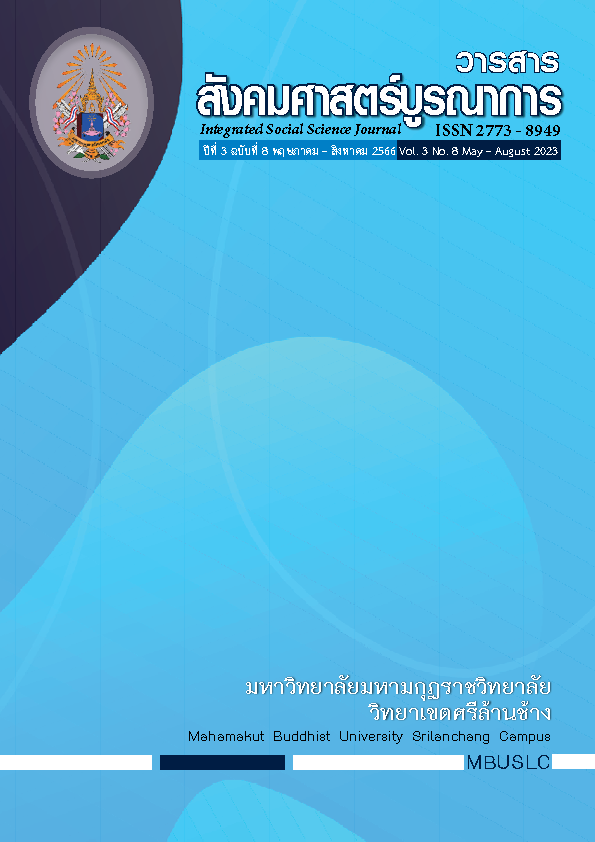THE PERSONNEL ADMINISTRATION BASED ON APARIHANIYADHAMMA 7 OF SCHOOL ADMINISTRATORS UNDER LOEI PRIMARY EDUCATIONAL SERVICE AREA OFFICE 1
Main Article Content
Abstract
The objectives of this research were to study the personnel administration condition of educational institution administrators under the Office of Loei Primary Educational Service Area 1, to study the condition of personnel administration according to the Seven Aparihāniyadhamma of educational institution administrators under the Office of Loei Primary Educational Service Area 1, and to propose the guideline for personnel administration according to the Seven Aparihāniyadhamma of educational institution administrators under the Office of Loei Primary Educational Service Area 1. This study was carried out by means of mixed-method research. The population used in this study was a total of 1,220 administrators and teachers of schools under the Office of Loei Primary Educational Service Area 1. 291 of those were selected as the samples based on Krejcie and Morgan table, stratified random sampling and simple random sampling (lottery). The tool used was a five-rating scale questionnaire. The statistics used were frequency, percentage, mean, and standard deviation. F key informants including academicians were interviewed using an interview form. The qualitative data were interpreted by contextual content analysis.
The research results were as follows: 1. The overall mean of the personnel administration condition of educational institution administrators under the Office of Loei Primary Educational Service Area 1 was at a high level. If classified by aspect, all studied aspects were at a high level, which can be ordered from the highest to the lowest mean as follows: enhancing the efficiency of official operations; manpower planning and positioning, discipline and discipline maintenance, resignation from government service and, recruitment and appointment. 2. The overall mean of the personnel administration according to the Seven Aparihāniyadhamma of educational institution administrators under the Office of Loei Primary Educational Service Area 1 was at a high level. If classified by aspect, all studied aspects were at a high level, which can be ordered from the highest to the lowest mean as follows: manpower planning and positioning, enhancing the efficiency of official operations, discipline and discipline maintenance, resignation from government service and, recruitment and appointment. 3. The guideline for personnel administration according to the Seven Aparihāniyadhamma of educational institution administrators under the Office of Loei Primary Educational Service Area 1 was that there should be participation in the meeting used to plan for requesting manpower according to the needs of educational institutions. All involved members should respect the resolutions at the meeting used as a guideline for requesting manpower by following the order of the chief. Gender must be determined for manpower planning and positioning. Workforce planning should be performed to promote the school's advantages to bring in quality personnel before bringing the manpower plan into the meeting of the school committee.
Article Details

This work is licensed under a Creative Commons Attribution-NonCommercial-NoDerivatives 4.0 International License.
บทความที่ได้รับการพิจารณาจากคณะกรรมการผู้ทรงคุณวุฒิและเผยแผ่ในวารสารฉบับนี้ เป็นทัศนคติและข้อคิดเห็นส่วนบุคคลของผู้เขียนแต่ละท่าน ไม่ถือว่าเป็นทัศนะคติและความรับผิดชอบ
ของบรรณาธิการ
บทความ ข้อมูล เนื้อหา รูปภาพ ฯลฯ ที่ได้รับการตีพิมพ์ในวารสารสังคมศาสตร์บูรณาการ ถือเป็นลิขสิทธิ์ของวารสารสังคมศาสตร์บูรณาการ หากบุคคลหรือหน่วยงานใดต้องการนำทั้งหมดหรือส่วนหนึ่งส่วนใดไปเผยแพร่ต่อหรือเพื่อกระทำการใด ๆ จะต้องได้รับอนุญาตเป็นลายลักอักษรจากวารสารสังคมศาสตร์บูรณาการ ก่อนเท่านั้น
References
กลุ่มสารสนเทศ สนผ, สำนักงานคณะกรรมการการศึกษาขั้นพื้นฐาน. (2564, 14 กรกฎาคม). ข้อมูลพื้นฐานโรงเรียน สังกัด สพป.เลย เขต 1. ออนไลน์. สืบค้นเมื่อ 14 กรกฎาคม 2564 แหล่งสืบค้น https://data.bopp-obec.info/emis/school.php?Area_CODE=4202
จักรกฤษณ์ โพดาพล. (2564). ผู้บริหารกับพรหมวิหารธรรม. ออนไลน์. สืบค้นเมื่อ 31 สิงหาคม 2564 แหล่งสืบค้น https://slc.mbu.ac.th/article/17910/ผู้บริหารกับพรหมวิหารธe/
พระครูวิจิตรปทุมรัตน์. (2554). การบริหารงานบุคคลโรงเรียนประถมศึกษา เขตคลองสามวา กรุงเทพมหานคร. วิทยานิพนธ์ปริญญาพุทธศาสตรมหาบัณฑิต. พระนครศรีอยุธยา: บัณฑิตวิทยาลัย มหาวิทยาลัยมหาจุฬาลงกรณราชวิทยาลัย
พระครูสังฆรักษ์วีระศักดิ์ จนฺทวํโส (รถจันทร์วงษ์). (2556). การบริหารงานบุคคลตามหลักอปริหานิยธรรม 7 ของโรงเรียนมัธยมศึกษา เขตธนบุรี กรุงเทพมหานคร. วิทยานิพนธ์ปริญญาพุทธศาสตรมหาบัณฑิต. พระนครศรีอยุธยา: บัณฑิตวิทยาลัย มหาวิทยาลัยมหาจุฬาลงกรณราชวิทยาลัย
พระมหาประยูร ธีรวโร (ตระการ). (2556). การบริหารงานบุคคลในโรงเรียนมัธยมศึกษาเขตบางกอกใหญ่ สังกัดสำนักงานเขตพื้นที่การศึกษากรุงเทพมหานคร เขต 1. วิทยานิพนธ์ปริญญาพุทธศาสตรมหาบัณฑิต. พระนครศรีอยุธยา: บัณฑิตวิทยาลัย มหาวิทยาลัยมหาจุฬาลงกรณราชวิทยาลัย
พระมหาประสงค์ กิตฺติญาโณ (พรมศรี). (2555). การศึกษาเปรียบเทียบการบริหารงานบุคคลในองค์กรสมัยใหม่กับแนวคิดทางพระพุทธศาสนา. วิทยานิพนธ์ปริญญาพุทธศาสตรดุษฎีบัณฑิต. พระนครศรีอยุธยา: บัณฑิตวิทยาลัย: มหาวิทยาลัยมหาจุฬาลงกรณราชวิทยาลัย
พระมหาสุเทพ สุเทวเมธี. (2559). การบริหารงานบุคคลขององค์การบริหารส่วนตาบล ในอำเภอเมือง จังหวัดพิษณุโลก. วิทยานิพนธ์ปริญญาพุทธศาสตรมหาบัญฑิต. พระนครศรีอยุธยา: บัณฑิตวิทยาลัย: มหาวิทยาลัยมหาจุฬาลงกรณราชวิทยาลัย
พระวิไลสอน อาจารสิริ. (2551). ศึกษาหลักพุทธรรมกับการบริหารงานบุคคลในโรงเรียนวิถีพุทธ สังกัดสำนักงานเขตพื้นที่การศึกษานนทบุรี เขต 2. วิทยานิพนธ์ปริญญาพุทธศาสตรมหาบัณฑิต. พระนครศรีอยุธยา: บัณฑิตวิทยาลัย มหาวิทยาลัยมหาจุฬาลงกรณราชวิทยาลัย
พระอธิการปรีชา ติกฺขาโณ (มาทา). (2561). ประสิทธิผลการบริหารงานตามหลักอปริหานิยธรรมของเทศบาลตำบลนาแก้ว อำเภอเกาะคา จังวัดลำปาง. วิทยานิพนธ์ปริญญาพุทธศาสตรมหาบัณฑิต. พระนครศรีอยุธยา: บัณฑิตวิทยาลัย มหาวิทยาลัยมหาจุฬาลงกรณราชวิทยาลัย
สำนักงานเขตพื้นที่การศึกษาประถมศึกษาเลย เขต 1. (2563). รายงานผลการดำเนินงานประจำปีงบประมาณ พ.ศ. 2564. เลย: กลุ่มงานนโยบายและแผน สำนักงานเขตพื้นที่การศึกษาประถมศึกษาเลย เขต 1
สีวรรณ์ ไชยกุล. (2562). การบริหารงานบุคลากรของผู้บริหารสถานศึกษาสังกัดสำนักงานเขตพื้นที่การศึกษาประถมศึกษายะลาเขต 3. สารนิพนธ์ปริญญาศึกษาศาสตรมหาบัณฑิต. สงขลา: คณะศึกษาศาสตร์และศิลปศาสตร์ มหาวิทยาลัยหาดใหญ่

